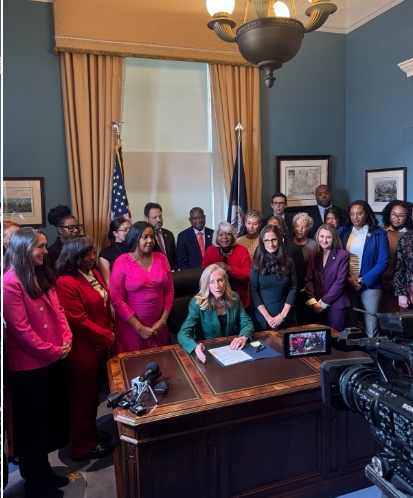See below for video and some highlights of a brilliant job by Rep. Gerry Connolly (D-VA11), during the U.S. House Committee on Oversight & Reform hearing earlier today, examining the impact of the Supreme Court ending Roe v. Wade. Note that when Rep. Connolly refers to Ms. Hawley, he’s talking about Erin Hawley of the far-right “Alliance Defending Freedom” (“an American conservative Christian legal advocacy group focused on blocking rights and protections for LGBTQ people; expanding Christian practices within public schools and in government; and preventing access to abortion and contraception.”) and also the wife of far-right Sen. Josh Hawley (R-MO).
“Remember your constitutional history? So Ms. Hawley tells us, citing Justice Alito, there’s no provision in the constitution that says there’s a right to an abortion. Show me in the constitution where the Founders in writing the constitution granted the rights of the Supreme Court to review and nullify legislation passed by Congress or any other legislative body in America. Does that language exist in the constitution? No, it does not exist at all. So by Mr. Alito’s and Ms. Hawley’s own logic, this opinion is questionable, based on the constitution.
In fact, do you remember when the first time the right to review legislation or the legislative actions of a legislative body was ever asserted by the Supreme Court? 1804, Marbury v Madison, and it was made up by John Marshall, made up out of whole cloth. He said it was an implied power…You remember the first time in fact they used that power they asserted in 1804, because I think it’s relevant? Dred Scott, 1857. That is the first time in American history a Supreme Court overruled, nullified legislation passed by the Congress of the United States. How did that work out for us? It led directly to the Civil War. Directly. Because it overturned the compromise of 1850 and it asserted that no Black man or woman, freed or otherwise, had the same rights as a White person; they could NEVER be a full citizen of the United States. A wretched and reprehensible decision…
And the court sadly…has a long history – Plessy v Ferguson, Korematsu, lots of other decisions – that tragically discriminated, in some cases almost violently, against groups of Americans. Now in this case, it’s half the population…
…So what about this equality thing? Do men have restrictions? Has the Supreme Court said, men, here are some limitations on what control you have over your own body? Any of them? I can’t recall…So let’s just for the sake of argument say in fact there are none. With respect to women, with this decision, it’s a pretty fundamental restriction on their bodies and what they can do with them…
…Is it possible, now that we’re going to revert to pre-Roe and the chaos that reined, that by the way led to Justice Blackmun, a Republican-appointed conservative justice, deciding we had to have a universal standard and a basic standard that was a right in 1973, is it now possible that women could be criminalized and/or medical providers criminalized by some states?…Somebody could be charged with a crime for a miscarriage?…Astounding.”
Justice Alito tells us that since no mention of abortion exists in the Constitution, surely such a right cannot possibly exist. Tell me, where in the Constitution is the Supreme Court granted the authority to overturn laws passed by the Congress?
Your logic, Mr. Justice. pic.twitter.com/Mwb2MIqlvE
— Rep. Gerry Connolly (@GerryConnolly) July 13, 2022

















